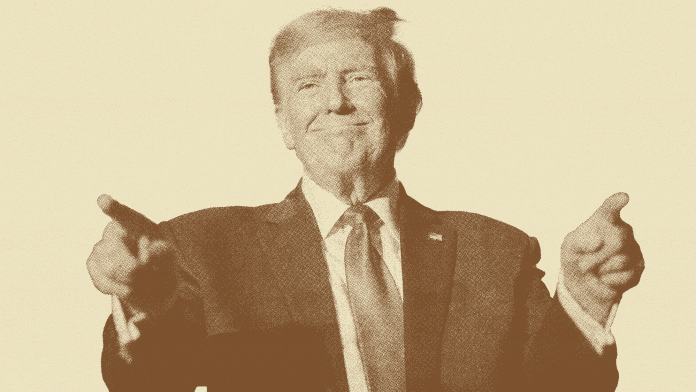Is Donald Trump that clever, or are the media still just that unprepared? Whatever the reason, he continues to be just as adept as ever at running circles around the press and public.
One of his most effective tools is what we might call the Trump Two-Step, in which the former president says something outrageous, backs away from it in the face of criticism, and then fully embraces it. The goal here is to create a veneer of deniability. It doesn’t even need to be plausible; it just needs to muddy the waters a bit.
That pattern is clear in his recent invocations of a “bloodbath” if he doesn’t win the 2024 presidential election. During a March 16 speech in Ohio, Trump blasted President Joe Biden’s push for electric vehicles. (Trump is angry that the United Auto Workers endorsed Biden, who walked on a picket line with striking employees, rather than Trump, who held a rally at a nonunion shop.) It’s difficult to capture the full context of Trump’s remarks because he meanders so much, but he was speaking about the auto industry when he warned about a “bloodbath.” Here’s a snippet from the full transcript:
We’re going to put a 100 percent tariff on every single car that comes across the line, and you’re not going to be able to sell those cars, if I get elected. Now, if I don’t get elected, it’s going to be a bloodbath for the whole … That’s going to be the least of it. It’s going to be a bloodbath for the country. That’ll be the least of it. But they’re not going to sell those cars.
As Semafor’s David Weigel laid out, the “bloodbath” remark went viral after it was snipped and circulated by liberal social-media influencers. Mainstream reporters, scrambling to catch up with the zeitgeist, wrote stories that covered the line out of context. This was somewhat understandable—Trump is, after all, the person who ranted about “American carnage” in his inaugural address—but also sloppy and wrong. Politico, for example, reported that “it was unclear what the former president meant exactly,” leading a spokesperson for a pro-Trump super PAC to ask whether it is “standard practice for you to cover events you don’t watch.”
[Adam Serwer: The U.S. media is completely unprepared to cover a Trump presidency]
Trump and his allies leaped to portray the whole thing as evidence of the media’s dishonesty. They said it was self-evident that he was speaking metaphorically. “The Fake News Media, and their Democrat Partners in the destruction of our Nation, pretended to be shocked at my use of the word BLOODBATH, even though they fully understood that I was simply referring to imports allowed by Crooked Joe Biden, which are killing the automobile industry,” Trump wrote on Truth Social. Elon Musk posted on X, “Legacy media lies.”
That was the end of it, right? Of course not. On Tuesday, Trump spoke in Michigan, where he once again used the word, this time literally. “I stand before you today to declare that Joe Biden’s border bloodbath—and that’s what it is; it’s a bloodbath; they tried to use this term incorrectly on me two weeks ago … but it’s a border bloodbath, and it’s destroying our country,” he said. The Republican National Committee also launched a website called BidenBloodbath.com, which warns that “there is blood on Biden’s hands.” (In the same speech, Trump said that accused criminals are “not humans; they’re animals,” the sort of dehumanizing rhetoric that helps create conditions for violence.)
Trump ends up getting it both ways: He attacks the media for misrepresenting him as a prophet of violence, then turns around and blithely prophesies violence. Anyone who’s willing to gamble that he won’t be making even more explicit predictions of election-related bloodshed by this summer is either a political hack or a fool easily parted from his money (or perhaps both, like Musk).
Once you recognize the Trump Two-Step, you see it everywhere. The ur-example might be his plan for a registry of Muslims in the U.S., which emerged during his first campaign. Trump had been saying all manner of inflammatory things about Muslims when a reporter asked him whether he would consider a database tracking Muslims in the United States. Trump, who seems terrified of appearing conciliatory or caught off guard, replied, “I would certainly implement that. Absolutely.” The backlash was immediate, and included comparisons to Nazi Germany. Trump backed away, tweeting, “I didn’t suggest a database—a reporter did.” But when it became apparent that anti-Muslim bigotry was popular with his supporters, he started pushing a plan to ban Muslims from entering the country.
[David A. Graham: Trump says he’ll be a dictator on ‘day one’]
As president, Trump followed the same pattern. In the fall of 2019, Trump was facing impeachment for trying to get Ukraine to interfere in the 2020 election on his behalf. He denied the charges, which he called a witch hunt. Meanwhile, he continued to do exactly the thing he said he hadn’t done, publicly calling on China to investigate the Biden family to aid his own reelection.
And he has made the two-step a big part of his reelection strategy. In December, Sean Hannity teed Trump up with a softball question, asking him to affirm that he wouldn’t abuse his power if elected. Trump declined, saying he wanted to be a dictator on day one, but only on day one. (Cold comfort!) When the remark drew horror, Trump said he’d just been kidding around, suggesting that people needed to lighten up. Then, a few days later, he once again said that he planned to be a dictator on his first day in office.
Trump’s fans often say that what they admire about him is that, like it or not, he says what he means. So why are they so resistant to taking him at his word?

















